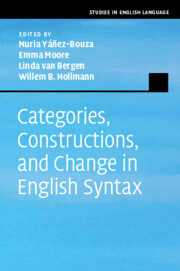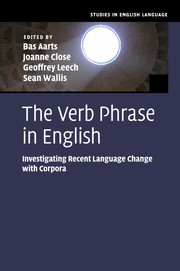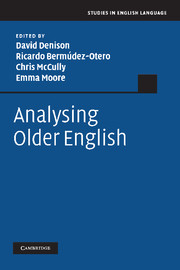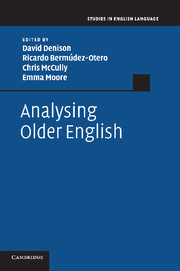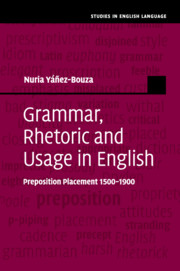Categories, Constructions, and Change in English Syntax
A pioneering collection of new research that explores categories, constructions, and change in the syntax of the English language. The volume, with contributions by world-renowned scholars as well as some emerging scholars in the field, covers a wide variety of approaches to grammatical categories and categorial change, constructions and constructional change, and comparative and typological research. Each of the fourteen chapters, based on the analysis of authentic data, highlights the wealth and breadth of the study of English syntax (including morphosyntax), both theoretically and empirically, from Old English through to the present day. The result is a body of research which will add substantially to the current study of the syntax of the English language, by stimulating further research in the field.
- Covers a wide range of chronological periods in the history of English
- Presents authoritative case studies with a theoretical contribution that each address the problem of what is required in (historical) linguistics
- Provides a variety of methodological approaches to the study of English syntax, ideal for scholars familiar with traditional philological methods, as well as those who look for new research methods
Product details
June 2022Paperback
9781108411424
423 pages
228 × 151 × 23 mm
0.62kg
38 b/w illus. 45 tables
Available
Table of Contents
- Introduction: analysing English syntax past and present Nuria Yáñez-Bouza, Emma Moore, Linda van Bergen and Willem B. Hollmann
- Part I. Approaches to Grammatical Categories and Categorial Change:
- 1. What is special about pronouns? John Payne
- 2. What for? Bas Aarts
- 3. Whatever happened to 'whatever'? Dan Mccolm and Graeme Trousdale
- 4. Are comparative modals converging or diverging in English? Different answers from the perspectives of grammaticalisation and constructionalisation Elizabeth Closs Traugott
- 5. The definite article in Old English: evidence from Ælfric's Grammar Cynthia L. Allen
- Part II. Approaches to Constructions and Constructional Change:
- 6. How patterns spread: the to-infinitival complement as a case of diffusional change, or 'To-infinitives, and beyond!' Bettelou Los
- 7. 'Me Liketh/Lotheth' but 'I Loue/Hate': impersonal/non-impersonal boundaries in old and Middle English Ayumi Miura
- 8. 'That's luck, if you ask me': the rise of an intersubjective comment clause Laurel J. Brinton
- 9. Misreading and language change: a foray into qualitative historical linguistics Sylvia Adamson
- 10. The conjunction and in phrasal and clausal structures in the Old Bailey Corpus Merja Kytö and Erik Smitterberg
- Part III. Comparative and Typological Approaches:
- 11. The role played by analogy in processes of language change: the case of English have-to compared to Spanish tener-que Olga Fischer and Hella Olbertz
- 12. Modelling step change: the history of will-verbs in Germanic Kersti Börjars and Nigel Vincent
- 13. Possessives world-wide: genitive variation in varieties of English Benedikt Heller and Benedikt Szmrecsanyi
- 14. American English: no written standard before the twentieth century? Christian Mair.

